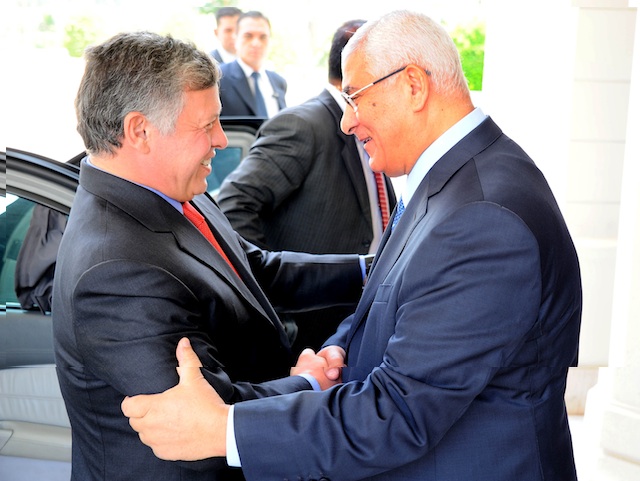SUMMARY
This is AI generated summarization, which may have errors. For context, always refer to the full article.

CAIRO, Egypt – Jordan’s king met Egypt’s interim leaders Saturday, July 20, the first head of state to visit since the army ousted its Islamist president, as a panel was appointed to amend the constitution.
The caretaker government sworn in this week has had its work cut out, with tensions running high amid protests by supporters of ousted president Mohamed Morsi calling for his return and deadly clashes on Friday night.
King Abdullah II of Jordan, who himself faces challenges at home from Islamists, was among the first leaders to congratulate Egyptians after Morsi was overthrown by the military in a July 3 military coup.
The monarch was greeted at Cairo airport by the army-backed interim prime minister Hazem al-Beblawi, and held talks with president Adly Mansour and vice president Mohamed ElBaradei.
King Abdullah pledged his support “for Egyptian national choices”, a presidential statement said, with the two leaders agreeing to boost ties.
His visit came as the newly-installed regime launched a campaign to burnish its credibility, and as the interim president set the constitutional reform process in motion.
Mansour appointed a committee of four university professors and six judges to draft the amendments to the Islamist-drafted constitution adopted under Morsi’s presidency within 30 days.
The panel’s amendments will be presented to a 50-strong body representing different groups in Egyptian society, which will submit final changes to the president.
He will then have 30 days to call a referendum on the new charter.
But Morsi’s supporters have rejected the legitimacy of the interim authorities.
Thousands of them pressed ahead with a sit-in at Cairo’s Rabaa al-Adawiya mosque on Saturday, where they have vowed to stay until their president is reinstated.
The Islamists rallied in their tens of thousands on Friday, waving Egyptian flags, carrying portraits of the toppled Islamist leader and denouncing Abdel Fattah al-Sisi, the army chief behind the coup.
Despite warnings by the military, some protests turned violent, with three people killed in the Nile Delta city of Mansura.
The protests, dubbed “Breaking the Coup” by Morsi’s Muslim Brotherhood, came three days after Mansour swore in the caretaker cabinet, which has met with a mixed international response.
The African Union has suspended Egypt’s membership, but some oil-rich Arab countries in the Gulf that distrusted Morsi have pledged billions of dollars in aid.
Britain announced it was revoking export licences for equipment used by Egypt’s military and police amid concerns that it could be used against protesters.
Egypt’s new foreign minister, Nabil Fahmy, said on Saturday that he would prioritize “defending the revolution abroad”.
The ministry would “form a committee to follow what is published about the revolution abroad and to provide sound information,” Fahmy told a news conference.
Egypt also sent an envoy to African states to convince them that Morsi had been removed by a popular revolution, he added.
The foreign minister sounded a more cautious note in dealing with the Syrian crisis, saying Morsi’s decision to cut diplomatic ties with the war-torn country would be “re-examined”.
Fahmy is due to meet the new leader of Syria’s main opposition coalition, Ahmad al-Assi, on Sunday, July 21.
“There is no intention of jihad in Syria,” the former Egyptian ambassador to Washington said, in reference to calls for a holy war in Syria under Morsi’s presidency.
He did not address Morsi’s fate, after European and US calls for the new government to release him from detention.
The deposed president has been held in custody since his overthrow, and the authorities have also detained other senior Brotherhood leaders and frozen their assets, prompting international concern.
UN rights chief Navi Pillay summoned the Egyptian ambassador in Geneva and asked for information about those detained in the sweeping arrests made since the coup, her spokesman said.
German Chancellor Angela Merkel was one of the first to call for Morsi’s release, and her Foreign Minister Guido Westerwelle, speaking by phone on Saturday, pressed on his Egyptian counterpart “the need to return to the democratic process.
Supporters of Egypt’s first freely elected leader believe a sustained campaign of protests could persuade the military to restore him briefly ahead of general elections.
A vast crowd had gathered at the Rabaa al-Adawiya mosque on Friday, where Morsi loyalists have camped out since the week before the military overthrew him.
Although mostly peaceful, the pro-Morsi protests have resulted in deadly clashes, with the unrest claiming more than 100 lives in all, according to an AFP tally. – Rappler.com
Add a comment
How does this make you feel?
There are no comments yet. Add your comment to start the conversation.